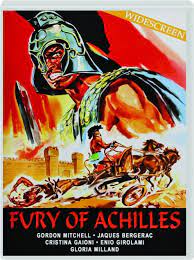
The war between the Greeks and Troy has been going on for ten years. Unable to defeat Troy the Greeks take over the city of Lynessos. As spoils of war the women are divvied up between the men. King Agamemnon (Mario Patri) has first pick. He chooses Chryseis (Eleonora Bianchi), a priestess and the daughter of Cressus (Nando Tamberlani), the priest of Apollo. Cressus pleads for Apollo to intercede on his daughter’s behalf. Apollo causes a great storm and plague to descend on the Greeks. After days of seeing his men fall ill and die Achilles (Gordon Mitchell) confronts Agamemnon. In a peak of petulance Agamemnon agrees to send Chryseis back to her father but intends on taking Achilles’ woman Briseis (Gloria Milland) in her place.
Pissed off at Agamemnon, Achilles withdraws from the battle. This gives the Trojans an opportunity. Trojan Prince Hector (Jacques Bergerac) believes that Achilles and his men are leaving and wants to attack. Trojan Prince Paris (Roberto Risso) urges caution. Unabated Hector attacks. The Trojans have the upper hand in the battle. Agamemnon is injured.
When Achilles hears about the attack he doesn’t join in but instead rages at Agamemnon for putting him in this position. Achilles drinks himself into a stupor. His friend, Patrocius (Ennio Girolami) dons Achilles armor and leads the men into the fray. The Trojans retreat but Hector remains to have it out with who he thinks is Achilles. When Patrocius is killed Achilles vows to avenge Patrocius and calls out Hector. Unable to avoid the fight Hector and Achilles do battle.
“The Fury of Achilles” was released in 1962 and was directed by Marino Girolami. Based on Homer’s epic poem “The Iliad” it is more than a run of the mill sword and sandal film. The film is a pretty dramatic and sober telling of the story. Originally titled “L'ira di Achille” it was internationally released as “The Fury of Achilles”.
Does the movie follow the poem? I don’t know. It’s been a really long time since I read Homer and I’m pretty sure I abandoned it before I got to the end.
The movie assumes that everyone knows about Helen of Troy and that her leaving her husband Menelaus to go with Paris to Troy sparks the war. Whether they do or not doesn’t matter since most people watch the film for the battles, and there are plenty of them.
The prints available are not the best I’ve seen which is a shame. A restoration of the film would actually raise it to more of an epic status. At an hour and fifty-eight minutes it’s one of the longer Italian peplum films done in the early sixties. Some have even compared it to Wolfgang Petersen’s “Troy” 2004. Although shorter than “Troy” it is more concise and, although a little stiff, Gordon Mitchell looks more like an Achilles than Brad Pitt did. Sorry. The story is also a little easier to follow and the dialogue in “Fury” is actually, for the most part, rather moving and profound.
During the movie Achilles mentions that he is immortal except for one part of his body that is vulnerable. It wasn't until there was only seven minutes left in the film before I remembered where Achilles was vulnerable. Duh.

